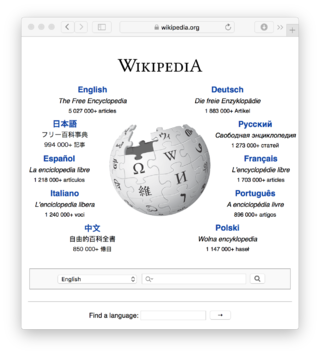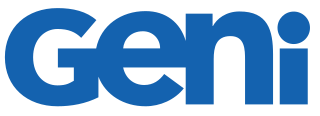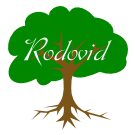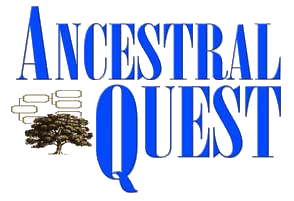
Genealogy is the study of families, family history, and the tracing of their lineages. Genealogists use oral interviews, historical records, genetic analysis, and other records to obtain information about a family and to demonstrate kinship and pedigrees of its members. The results are often displayed in charts or written as narratives. The field of family history is broader than genealogy, and covers not just lineage but also family and community history and biography.

A wiki is a form of hypertext publication on the internet which is collaboratively edited and managed by its audience directly through a web browser. A typical wiki contains multiple pages that can either be edited by the public or limited to use within an organization for maintaining its internal knowledge base.

Wiki software is collaborative software that runs a wiki, which allows the users to create and collaboratively edit pages or entries via a web browser. A wiki system is usually a web application that runs on one or more web servers. The content, including previous revisions, is usually stored in either a file system or a database. Wikis are a type of web content management system, and the most commonly supported off-the-shelf software that web hosting facilities offer.
Social software, also known as social apps or social platform includes communications and interactive tools that are often based on the Internet. Communication tools typically handle capturing, storing and presenting communication, usually written but increasingly including audio and video as well. Interactive tools handle mediated interactions between a pair or group of users. They focus on establishing and maintaining a connection among users, facilitating the mechanics of conversation and talk. Social software generally refers to software that makes collaborative behaviour, the organisation and moulding of communities, self-expression, social interaction and feedback possible for individuals. Another element of the existing definition of social software is that it allows for the structured mediation of opinion between people, in a centralized or self-regulating manner. The most improved area for social software is that Web 2.0 applications can all promote co-operation between people and the creation of online communities more than ever before. The opportunities offered by social software are instant connections and opportunities to learn. An additional defining feature of social software is that apart from interaction and collaboration, it aggregates the collective behaviour of its users, allowing not only crowds to learn from an individual but individuals to learn from the crowds as well. Hence, the interactions enabled by social software can be one-to-one, one-to-many, or many-to-many.
FamilySearch GEDCOM, or simply GEDCOM, is an open file format and the de facto standard specification for storing genealogical data. It was developed by The Church of Jesus Christ of Latter-day Saints, the operators of FamilySearch, to aid in the research and sharing of genealogical information. A common usage is as a standard format for the backup and transfer of family tree data between different genealogy software and Web sites, most of which support importing from and exporting to GEDCOM format.
FamilySearch is a nonprofit organization and website offering genealogical records, education, and software. It is operated by the Church of Jesus Christ of Latter-day Saints and is part of the church's Family History Department (FHD). The Family History Department was originally established in 1894, as the Genealogical Society of Utah (GSU); it is the largest genealogy organization in the world.

Genealogy software is computer software used to record, organize, and publish genealogical data.
Ancestry.com LLC is an American genealogy company based in Lehi, Utah. The largest for-profit genealogy company in the world, it operates a network of genealogical, historical records, and related genetic genealogy websites. It is owned by The Blackstone Group, which acquired the company on December 4, 2020, in a deal valued at $4.7 billion.
Wikimapia is a geographic online encyclopedia project. The project implements an interactive "clickable" web map that utilizes Google Maps with a geographically-referenced wiki system, with the aim to mark and describe all geographical objects in the world.

Gramps, formerly GRAMPS, is a free and open-source genealogy software. It is developed in Python using PyGObject and utilizes Graphviz to create relationship graphs.

Random Acts of Genealogical Kindness (RAOGK) is a web-based genealogical research co-op that functions solely by the services of volunteers. Volunteers from any part of the world may offer services to any requester, such as research of birth, marriage, and death records, public records, obituaries, and deeds. Some volunteers photograph burial sites, cemeteries and tombstones. Volunteers also offer "lookup" services in various history and genealogy books, such as those books owned by the volunteer or books held in libraries and historical societies. Any fees requested by the volunteers are reimbursements for actual costs involved, such as gas mileage, photocopying, record fees, or postage. However, in most cases, the services are rendered free of charge in the spirit of offering a random act of kindness to a stranger in search of family ties. Thus the name of the organization came into being from the nature of the services offered.
This article compares several selected client-based genealogy programs. Web-based genealogy software is not included.
Family Historian is a genealogy software program designed and written by Calico Pie Limited, a UK software company founded by Simon Orde in 1995. Family Historian has won numerous awards, including coming top in the two most recent group comparisons of top genealogy programs, by Which? Computing - one of the Which? stable of consumer magazines. In 2019, 2020, 2021 and 2022 it received the highest overall score from TopTenReviews, in a group comparison with other leading genealogy software worldwide.

Geni is an American commercial genealogy and social networking website, founded in 2006, and owned by MyHeritage, an Israeli private company, since November 2012. As of 2024, MyHeritage has kept its genealogical website separate from Geni's website, though you can still match Geni profiles to trees on MyHeritage and to other family tree sites and digitized records.
MyHeritage is an online genealogy platform with web, mobile, and software products and services, introduced by the Israeli company MyHeritage in 2003. Users of the platform can obtain their family trees, upload and browse through photos, and search through over 19.9 billion historical records, among other features. In early 2021 they were acquired by Francisco Partners for $600 million.
Confluence is a web-based corporate wiki developed by Australian software company Atlassian. Atlassian wrote Confluence in the Java programming language and first published it in 2004. Confluence Standalone comes with a built-in Tomcat web server and hsql database, and also supports other databases.

Genbox Family History is genealogy software for Microsoft Windows, developed by Thoughtful Creations. It functions as a database, a research planner and task organizer, a data analyzer, a chart producer, and a report writer.

Rodovid is a free online collaborative family tree portal. Originally a Ukrainian project, as of 2023 it had active communities in 25 languages. It provides a web service built using MediaWiki and its own Rodovid Engine software to help store and visualize family relationships.

Ancestral Quest (AQ) is a genealogy software application for Microsoft Windows developed by Incline Software, LC. It features data entry with sourcing capabilities and scrapbook extensions; a print engine for standard or custom charts and reports; a web page creator; a collaboration engine; and an extension tool for other genealogy databases.

WikiTree is a genealogy website that allows users to research and to contribute to their own family trees while building and collaborating on a singular worldwide family tree within the same system. WikiTree is free for the user and financed via advertisements displayed to unregistered users. WikiTree is owned and hosted by founder's company Interesting.com, Inc.










